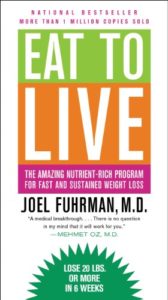
The Benefits of Fasting
What we eat influences our health. But how much we eat does too.
Studies show that fasting, or even periodically adopting a low-calorie diet that mimics the effects of fasting, may generate a wide range of health benefits. These include increased weight loss, normalizing insulin sensitivity and even slowing down the aging process.
 Dr. Joel Fuhrman, author of Eat to Live, has overseen hundreds of fasts for medicinal purposes. In a WebMD article, he states: “We know that the body is unable to rid itself of toxins when we eat a diet low in nutrients” that includes processed foods. “So you see a buildup of waste products in the cells — AGE, advanced glycation end products — that build up in cellular tissues and lead to atherosclerosis, aging, diabetes, nerve damage, and the deterioration of organs. This is basic science and physiology every doctor learns in medical school. … Fasting allows the body to most effectively remove these waste products. The body is designed to fast; we do it every night.”
Dr. Joel Fuhrman, author of Eat to Live, has overseen hundreds of fasts for medicinal purposes. In a WebMD article, he states: “We know that the body is unable to rid itself of toxins when we eat a diet low in nutrients” that includes processed foods. “So you see a buildup of waste products in the cells — AGE, advanced glycation end products — that build up in cellular tissues and lead to atherosclerosis, aging, diabetes, nerve damage, and the deterioration of organs. This is basic science and physiology every doctor learns in medical school. … Fasting allows the body to most effectively remove these waste products. The body is designed to fast; we do it every night.”
Certain studies suggest fasting, which is to abstain from eating food for a certain period of time, can help treat such conditions as heart disease and depression. Other research involving mice showed fasting can help starve out cancer cells while protecting immune and other cells from chemotherapy’s toxic effects. According to the WebMD article, Dr. Fuhrman “has seen fasting — combined with improving the diet before and afterward — eliminate lupus, arthritis and chronic skin conditions like psoriasis and eczema. He says he has also seen fasting heal the digestive tracts of those with ulcerative colitis and Crohn’s disease, and lower blood pressure.”
But because fasting can be difficult (and usually requires medical supervision), simply restricting the number of calories eaten per day can also yield benefits. In the calorie restriction approach, the calorie intake is permanently reduced by 25-50%. It’s about gradually decreasing portion size (without malnutrition), as well as cutting back on certain fatty foods.
Dr. Valter Longo, Director of the Longevity Institute at the University of Southern California Leonard Davis School of Gerontology, has observed weight loss and slowed aging in people who follow fasting-like or fasting-mimicking diets (FMDs). The abstract of an article he co-authored for Science Translational Medicine (15 February 2017) summarizes the remarkable findings:
Abstract:
Calorie restriction or changes in dietary composition can enhance healthy aging, but the inability of most subjects to adhere to chronic and extreme diets, as well as potentially adverse effects, limits their application. We randomized 100 generally healthy participants from the United States into two study arms and tested the effects of a fasting-mimicking diet (FMD)—low in calories, sugars, and protein but high in unsaturated fats—on markers/risk factors associated with aging and age-related diseases. We compared subjects who followed 3 months of an unrestricted diet to subjects who consumed the FMD for 5 consecutive days per month for 3 months. Three FMD cycles reduced body weight, trunk, and total body fat; lowered blood pressure; and decreased insulin-like growth factor 1 (IGF-1). No serious adverse effects were reported. After 3 months, control diet subjects were crossed over to the FMD program, resulting in a total of 71 subjects completing three FMD cycles. A post hoc analysis of subjects from both FMD arms showed that body mass index, blood pressure, fasting glucose, IGF-1, triglycerides, total and low-density lipoprotein cholesterol, and C-reactive protein were more beneficially affected in participants at risk for disease than in subjects who were not at risk. Thus, cycles of a 5-day FMD are safe, feasible, and effective in reducing markers/risk factors for aging and age-related diseases. Larger studies in patients with diagnosed diseases or selected on the basis of risk factors are warranted to confirm the effect of the FMD on disease prevention and treatment.
 The participants in this study followed a 50% reduced calorie diet of 1,100 calories on the first day and 70% (700 calories) on the next four days. They resumed their normal habits, eating what they wanted, for the rest of the month.
The participants in this study followed a 50% reduced calorie diet of 1,100 calories on the first day and 70% (700 calories) on the next four days. They resumed their normal habits, eating what they wanted, for the rest of the month.
These studies show that humans may enjoy better old age and health by eating less or periodic fasting. After all, we’ve known since the 1930s that a 30% reduction in the amount of food consumed daily by worms, flies, rats, mice and monkeys has been linked to longer, more active lives in these animals.

